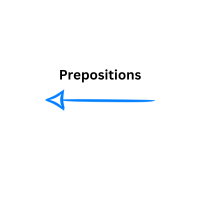Prepositions

About Prepositions:
Prepositions are an essential part of grammar in many languages, including English. Prepositions are words that show the relationship between a noun or pronoun and other words in a sentence. They help clarify the location, direction, time, manner, or possession of the subject or object of a sentence. Here are some general grammar rules about prepositions:
Types of Prepositions:
Simple Prepositions:
These are single-word prepositions like on, in, at, under, over, with, by, etc.
Compound Prepositions:
These are formed by combining two or more words, such as in front of, instead of, out of, according to, etc.
Phrasal Prepositions:
These are made up of verb + adverb/adjective combinations, like up to, out of, on behalf of, etc.
Prepositions of Place and Location:
Examples: in, on, at, under, over, between, among, beside, behind, above, below, inside, outside, etc.
Prepositions of Time:
Examples: in, on, at, before, after, during, until, since, for, by, etc.
Prepositions of Direction:
Examples: to, from, into, onto, towards, away from, through, along, etc.
Prepositions of Manner:
Examples: like, as, by, with, etc.
Prepositions of Possession:
Examples: of, ‘s (apostrophe + s)
Prepositions and Objects:
Prepositions are often followed by noun phrases or pronouns, which are called objects of the preposition.
For example, in the sentence: The book is on the table, on is the preposition, and the table is its object.
Prepositions and Verb Complements:
Some verbs are followed by specific prepositions when used in certain contexts.
For example: think about, listen to, depend on, look at, etc.
Prepositions and Gerunds:
Gerunds (verbs ending in -ing and functioning as nouns) are often used after certain prepositions, such as I’m interested in learning, She’s good at swimming, etc.
Prepositions and Infinitives:
Infinitives (to + base form of a verb) can also be used after certain prepositions, like She agreed to help, He decided to go, etc.
Prepositions at the End of Sentences:
In informal English, prepositions are sometimes used at the end of a sentence, although it is generally considered more formal to place them earlier in the sentence.
Practice is key to becoming comfortable with prepositions and their usage in English.
click here The Prepositions
click here What is a Pronoun? The Functions of the English pronouns.
click here What is a Noun? How to use it?